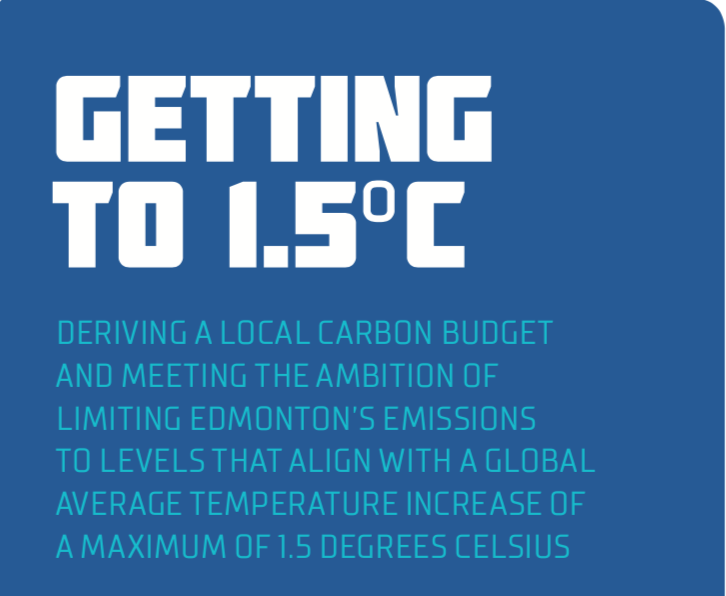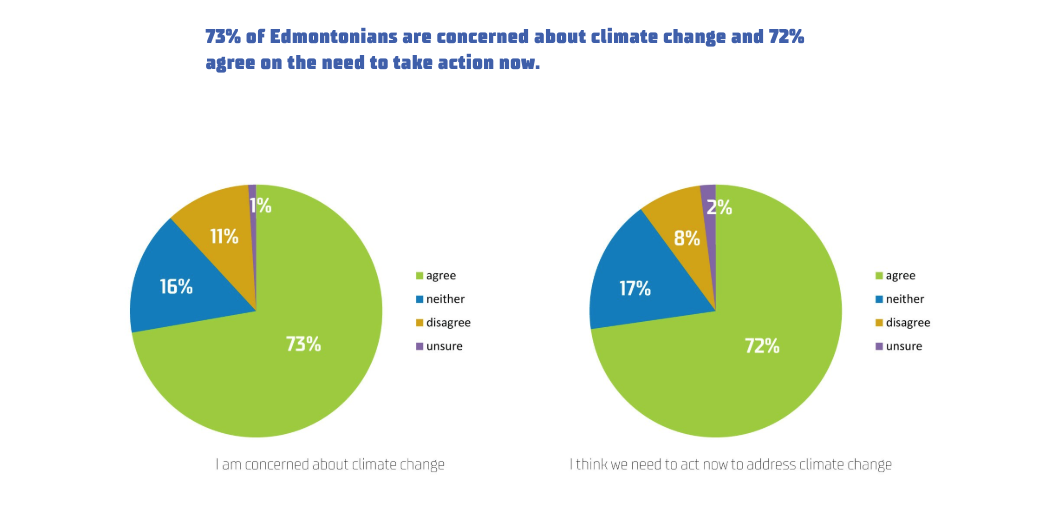Climate change is a threat we must address head-on
Today the City of Edmonton released an update on our Energy Transition Strategy which highlights preliminary findings made in response to City Council’s approval of the Edmonton Declaration in 2018. The Declaration committed mayors from around the world to recognize the immediate threat of climate change and consider our actions through a lens that would limit destabilizing warming to 1.5 °C. The 1.5 °C target is required to minimize the socioeconomic impacts of a warmer planet. The update we received today hits us with the hard truth that our Energy Transition Strategy, as is, will not allow us to accomplish that goal. We must do more if we are to take meaningful action to tackle climate change.

The summary report presents preliminary findings from modelling undertaken in response to City Council’s approval of the Edmonton Declaration in 2018.
Addressing human-caused climate change is a mandate City Council was given by Edmontonians. For the past two years, surveys have indicated that 73% of Edmontonians understand that climate change is a significant issue that requires action. This summer, the realities of climate change have been hard to ignore as we’ve seen its effects across Canada in the form of weather extremes such as floods in the east and fires in the west. If we continue down this path, climate change will continue to cause frequent and intense weather events that wreak havoc on communities, impact food production, threaten fresh water sources, disrupt the economy and impact everyone’s quality of life. My mayoral colleagues and I do not have the luxury of putting off the inevitable reckoning of climate change, because local government and the infrastructure and services we manage are at the front lines of this real risk.

Results from the Climate Change & Energy Perceptions Survey. The Survey was conducted with the help of an accredited professional research company and using a general population online panel.
That is why in March of 2018, during the Change for Climate Global Mayors Summit hosted here in Edmonton, I advocated for the signing of the Edmonton Declaration: a bold call-to-action for local governments of all sizes to seriously consider the role of scientific research and data in building ambitious climate action plans and to prioritize science-based decision-making that reinforces the Paris Agreement targets. As Edmontonians we have some of the highest per capita emissions in the world at approximately 20 tonnes per person. Along with this footprint, we have capacity for leadership and innovation, which adds up to a responsibility to take action and help in the development of solutions communities around the globe will require to achieve climate stabilization. Solving this challenge is the moonshot of our time, but what’s different is that global leadership is coming from the bottom up, rather than top down.
Our original Energy Transition Strategy set ambitious goals that stressed the City of Edmonton’s role in supporting Edmonton’s energy transition efforts by leading through example in our own civic operations. To meet that goal we’ve been working on expanding public transit options (Valley Line LRT) and electrifying our bus fleet (transportation accounts for 30% of Edmonton’s greenhouse gas emissions and 42% of energy used). We also created the Building Energy Benchmarking Program to help improve building energy efficiency, created a variety of programs to help homeowners make their own homes more energy efficient, supported business so that they can become more climate friendly, and in partnership with Alberta Ecotrust and the Edmonton Community Foundation, offered grants to help transition Edmonton into an energy sustainable and climate resilient city. We’ve also supported and advocated for ambitious, environmentally friendly infrastructure projects such as Blatchford, a new carbon-neutral community being built on the grounds of the former municipal airport.
Despite all these initiatives, however, we need to go further than the targets in the original Energy Transition Strategy if we are to meet the 1.5 °C target.
On August 19th, the report will be discussed at Executive Committee. I plan to make a motion directing City administration to develop a revised Community Energy Transition Strategy by fall 2020 that aligns the emissions targets and actions with the local carbon budget. A carbon budget outlines the cumulative amount of carbon dioxide (CO2) emissions permitted over a period of time to keep within a certain temperature threshold. As Edmonton’s current emissions levels (approx. 20Mtonnes per year) our carbon budget will be exceeded within 8 years. This means that we will not reach our 1.5 °C limit that we aspired to in the Edmonton Declaration. We cannot allow this to happen if we want the legacy we leave to our children to be a safe and healthy city.
I’m also asking administration to suggest a funding strategy that outlines the investment required by all levels of government to catalyze private investment necessary to achieve the local carbon budget. Cities are both key to solving the challenge of climate change, and typically quicker to adapt to innovation and change in comparison to states and countries. But climate change is not an issue that can be contained to a border or city limit. To address it effectively, we require alignment among all levels of government.
I’ve outlined the urgency of addressing climate change, but I also want to stress the opportunities a greener future offers Edmontonians. The report highlighted that the Community Energy Transition Strategy would deliver a net present value of $2.5 billion. This means energy cost savings to buildings, industry, and vehicles owners would be at least $2.5 billion greater than their investment costs. If the cost of carbon is included, this increased to $3.4 billion positive net value. The fact is that adapting to climate change means we would become economically resilient. Future economic opportunities will reside in low carbon technologies and processes and low emissions cities will be positioned to take advantage of those opportunities. Edmonton is at a competitive advantage if we pursue deeper, more ambitious emissions reductions targets.
And, after all, we are energy problem solvers here in Alberta, so this should be our moment to lead.
In fact, our economic and environmental aspirations should be one and the same if we are to secure a future for our children. There will be costs and tradeoffs to addressing climate change, but there will be catastrophic and irreversible costs if we don’t address this threat head-on. The question we should be asking is: do we want to adapt and proactively work to lessen the negative impacts of climate change, or do we want to be reactive in our approach? In my time as Mayor I’ve had the honour of witnessing how communities in our city are not afraid to confront threats head-on — it is the Edmonton way to take charge and lead. I have no doubt we’ll do the same to address the present threat of climate change.
Bravo.
I am forwarding this to our Municipal Mayor & Council.
If this can happen in Alberta (under your current regime), it emboldens the rest of us to emulate your progressive policies.
The best of luck to us all.